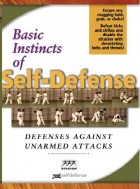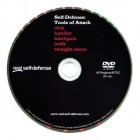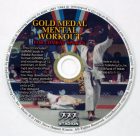Now a word about flexible weapons. Most flexible weapons are blunt — I know, there are flexible swords and composite weapons consisting of chain and a blade, but the likelihood of encountering one of those is slim. (Then there are piano-wire garrotes, but that’s a topic for another day.)
As with nonflexible blunt weapons, flexible weapons must be applied forcefully.
Fighters who successfully use flexible weapons are those who thoroughly dominate their opponents. The more flexible the weapon, the more important the dominating mind-set.
Techniques of nunchaku, the most versatile flexible weapon
As an example of a flexible weapon I chose the nunchaku (so setsu kon) because it is generally known, can be easily made, and in my opinion is the most versatile among flexible weapons — it can whack, stab, choke, or strangle as well as pinch and crush limbs.
The videos below show the variety of techniques possible with the nunchaku.
Bag work
Breaking an arm
Sparring against long pole
Attention:
Applying any of the techniques mentioned above is your sole responsibility.
Neither Never-Thought-of-It LLC nor the author of this self-defense tip, nor persons pictured in this self-defense tip, make any representation, warranty, or guarantee that the techniques described or shown in this tip will be safe, effective, or legal in any self-defense situation or otherwise.
The reader or viewer assumes all risks and hazards of injury or death to herself, himself, or others, as well as any resultant liability for the use of the techniques and methods contained in this self-defense tip.
Specific self-defense responses demonstrated or described in this self-defense tip may not be justified in certain situations in light of all the circumstances or under the applicable federal, state, or local law. Neither Never-Thought-of-It LLC nor the author of this self-defense tip makes any representation or warranty regarding the legality or appropriateness of any techniques described or demonstrated in this self-defense tip.
Self-defense tip from Thomas Kurz, co-author of Basic Instincts of Self-Defense and author of Science of Sports Training, Stretching Scientifically, and Flexibility Express.
Self-Defense Moves
For your defense moves to work under stress they must be based on your natural, instinctive reactions, require little strength and limited range of motion, and be proven in fighting experience.To learn how your natural reactions can instantly defeat any unarmed attack, see the video Basic Instincts of Self-Defense.
Defend Against Weapons
To defend against weapons you have to know how they are used. Also — every stick has two ends … the weapon of attack may become a weapon of defense in your hand …To learn how the typical street weapons (club, knife, razor) are used by an experienced streetfighter and how to practice with them, see the video Self-Defense: Tools of Attack — Club, Hatchet, Blackjack, Knife, Straight Razor.
Mental Toughness
Staying cool under pressure is more important for self-defense than being physically fit and technically skilled. If you can’t control your mind what can you control?To learn mental techniques that let you calmly face any threat and act rationally in the heat of a fight, click here.
For a complete list of our products, click here.








Could you please expand on why you believe the nunchukas are the most versatile flexible weapon?
Mark
The answer stares you in the face from videos above.
Pingback: External Focus vs. Internal Focus and Nunchaku | Tom Kurz's Weblog